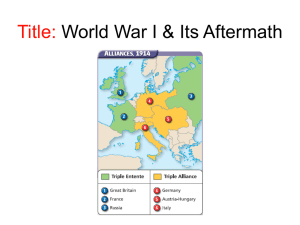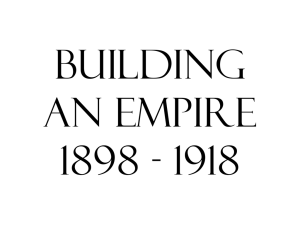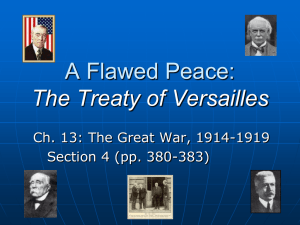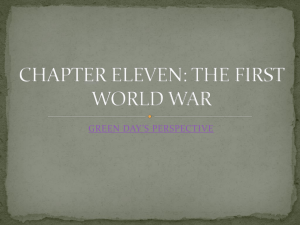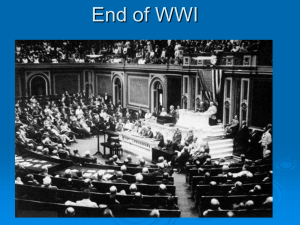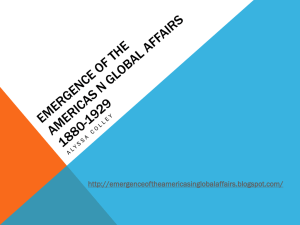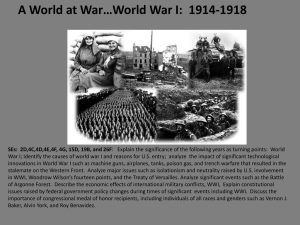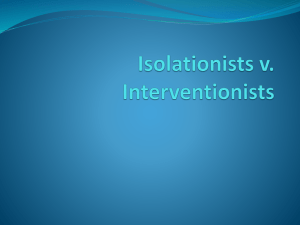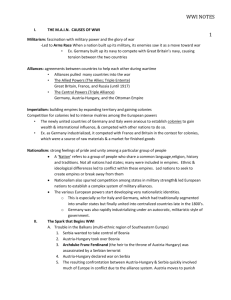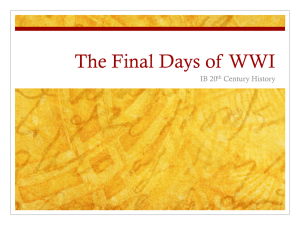WWI - Eaton Community Schools
advertisement
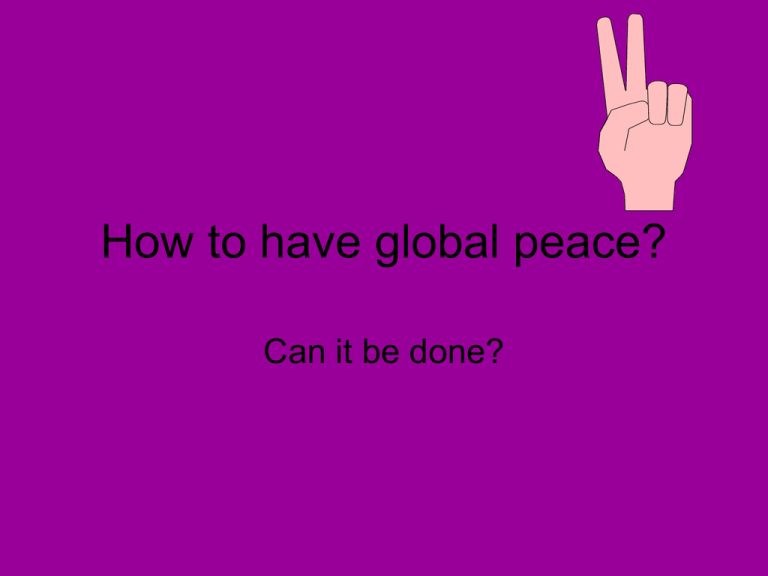
How to have global peace? Can it be done? Wilson’s vision is called the 14 Points Fourteen FourteenPoints Points • • • • It has 14 provisions puts an end to alliances freedom of the seas self-determination-the power to make decisions about ones future • arms reductions... • not everyone accepted, many changes had to be made The Paris Peace Conference • January 1919 • Wilson heads the U.S. delegation • “There must not be a balance of power, but a community of power; not organized rivalries, but an organized common peace.” --W. Wilson What does everybody want? • Wilson is not interested in spoils-rewards of war. He did not want territory from the losers • Other allies do want German territory divided. • Wilson finally agrees that allied powers can take over colonies. Wilson sets up the League of Nations • An organization in which the nations of the world would join together to ensure security and peace for all members. What does our President have to do? • He heads for home to convince Congress that the League of Nations is good • He has convinced the allies that it is good. Article 10 • The most important proposal for the League of Nations • “An attack on one nation is an attack on all” • Congress rejects • Why? This could bring us into more wars • We don’t want to set up another web of alliances. • That’s what got this war started to begin with. • It would weaken our independence. Versailles Treaty • Ended WWI • France wants harsh penalties on Germany • reparations-payment for economic injury. Germany owes $33 million to the allies. Wilson feels it could lead to more wars. • U.S. did not approve of because it included our commitment to the League of Nations. (“irreconcilable” senators) • Wilson fights for ratification, but does not get it. He suffered a stroke in the process. Little did we know. . . • The seeds of WWII were in the peace treaty of WWI. • None of the warring nations were fully satisfied with the peace treaty. • Here are some of the objections: France wants revenge!!! • Most of the war was fought on French soil. • They were denied a buffer state between France and Germany. (Rhineland) Germany suffers the most in the peace treaty. • They refuse to sign, but when the Allies threaten with invasion, they consent. • They lose land to France and Poland. • Forced to pay reparations of $33 million. • Forced to hand over all war materials and limit army to 100,000 men • they must surrender all large merchant ships Austria-Hungary • Shortly before the war ends, they separate into two different nations. • There land is given to many different countries. • Yugoslavia and Czechoslovakia are created • Austria-Hungary is forbidden to combine with Germany • Limit of 30,000 men for Austria’s army • Limit of 35,000 men for Hungary’s army What about Russia? • Not in the treaty negotiations. • Lost a lot of land. • This land was divided between many countries Meanwhile, back on our side of the world. Post-War Adjustments • U.S. is owed $11.5 billion • jobs are scarceespecially for AfricanAmericans • there is no plan to merge troops back into society • It will take our 2,000,000 American soldiers almost a year to get back home • but our economy is up! WWI FACTS TO KNOW How BIG was this war? • WWI was a war fought by 28 nations, and an estimated 65 million men, and was fought on 3 continents. Casualties • Allied Powers Central Powers • military battle deaths • military wounded • totals 4,889,000 12,809,000 17,698,000 3,132,000 8,420,000 11,552,000 European nations created by WWI Before and After What new nations were formed as a result of WWI? • • • • • • Estonia Latvia Lithuania Poland Czechoslovakia Yugoslavia WWI Cause and Effects • • • • • • Causes Imperialism Nationalism Militarism Alliances Assassination of Archduke Ferdinand • Austria-Hungary declares war on Serbia • Effects • Map of Europe is redrawn • League of Nations is formed • U.S. economy is up • U.S. suffers post-war disillusionment. Why is our Economy up? • Generating supplies for our troops generates money. • This money goes into our workers wallets and our nations wallet. We are almost done, and we have learned a lot! These are the things you need to know. And. . . • Analyze how governments and other groups have used propaganda to influence public opinion and behavior. • Describe the political, economic and social roots of imperialism. • Analyze the perspectives of the colonies and the colonized concerning: language, natural resources, labor, political systems and religion. And . . . • Trace the development of the U.S. as a world power with emphasis on: • a. The decision to enter WWI • b. President Wilson’s 14 points • c. Treaty of Versailles • d. The decision of the U.S. not to participate in the League of Nations Standards • Analyze the causes and effects of WWI with emphasis on: • a. Militarism, nationalism, imperialism and alliances. • b. The global scope, outcomes and human costs of the war. • c. The role of new technologies and practices, including the use of poison gas, trench warfare, machine guns, airplanes, submarines and tanks. • d. The Treaty of Versailles and the League on Nations. And. . . • Analyze instances in which the rights of individuals were restricted including: • a. Conscientious objectors in WWI. You have almost graduated from WWI class. • Make sure you study for this test. • As you can see, there is a lot to know. • And I am expecting you to know it!!! Quiz time • 5 questions 1. • Payment from one nation to another for economic injury suffered during a war is called a _________________. 2. • The worldwide organization aimed at ensuring security and peace was called the ________________________. 3. • President Wilson’s program for peace was called _____________________. The allies accepted it the U.S. did not. 4. • Why was post-war adjustments difficult for our soldiers coming back from the war? 5. • The ____________ treaty was signed by European powers, thus ending WWI. 6. • How did militarism bring Europe into World War I? 7. • How did the alliance system bring Europe into World War I? 8. • How did imperialism bring Europe into World War I? 9. • How did nationalism bring Europe into World War I? • Great Job!!!

